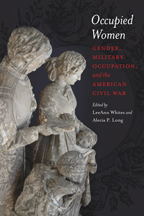
264 pages / 6.00 x 9.00 inches / no illustrations
History / United States - Civil War Period | Women's Studies
In the spring of 1861, tens of thousands of young men formed military companies and offered to fight for their country. Near the end of the Civil War, nearly half of the adult male population of the North and a staggering 90 percent of eligible white males in the South had joined the military. With their husbands, sons, and fathers away, legions of women took on additional duties formerly handled by males, and many also faced the ordeal of having their homes occupied by enemy troops. With occupation, the home front and the battlefield merged to create an unanticipated second front where civilians—mainly women—resisted what they perceived as unjust domination. In Occupied Women, twelve distinguished historians consider how women’s reactions to occupation affected both the strategies of military leaders and ultimately even the outcome of the Civil War.
Alecia P. Long is an associate professor of history and director of the Listening to Louisiana Women Oral History Project at Louisiana State University. She is the author of The Great Southern Babylon: Sex, Race, and Respectability in New Orleans, 1865–1920, winner of the Julia Cherry Spruill Prize for the best book in southern women’s history in 2005.
LeeAnn Whites is a professor of history at the University of Missouri. She is the author of The Civil War as a Crisis in Gender and Gender Matters: Civil War, Reconstruction, and the Making of the New South and coeditor of Women in Missouri History: In Search of Power and Influence. Alecia P. Long is an assistant professor of history at Louisiana State University. She is the author of The Great Southern Babylon: Sex, Race, and Respectability in New Orleans, 1865-1920, winner of the Julia Cherry Spruill Prize for the best book in southern women's history in 2005.Found an Error? Tell us about it.